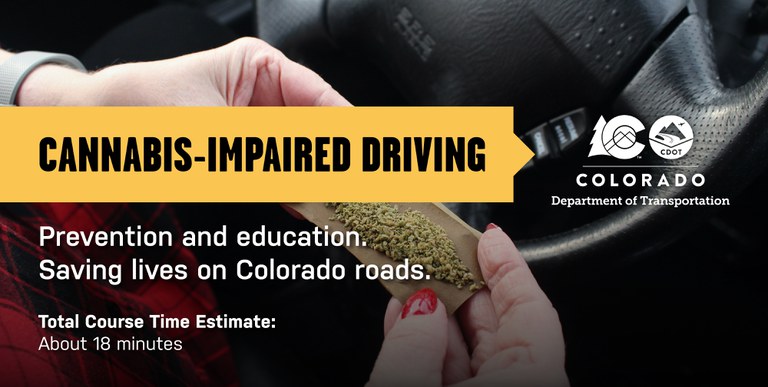Want to know more about cannabis and driving? Ask your budtender.
CDOT partners with online budtender training platform to inform front-line dispensary workers
 If you walk into a licensed retail cannabis dispensary in Colorado and see the hundreds of products on display, you’ll likely have a few questions. What’s the difference between Indica and Sativa? What are terpenes? What if I just want a functional high? You might pull out your phone to do a quick search, but odds are, you’ll ask the budtender with you right there at the counter.
If you walk into a licensed retail cannabis dispensary in Colorado and see the hundreds of products on display, you’ll likely have a few questions. What’s the difference between Indica and Sativa? What are terpenes? What if I just want a functional high? You might pull out your phone to do a quick search, but odds are, you’ll ask the budtender with you right there at the counter.
One question that doesn’t get asked often enough: Will I be OK to drive after I consume, and if not, when?
Why budtenders?
Budtenders are a trusted and friendly source of information if you’re a consumer looking for more cannabis education. So, CDOT, in an effort to make sure cannabis-industry workers have an up-to-date and accurate source of information when it comes to impaired driving, has revamped and updated its interactive budtender education course online.
CDOT has also just unveiled a brand new Cannabis-Impaired Driving Essentials Course. The course takes less than five minutes to complete and is available to the general public. CDOT is also working with state-sanctioned responsible vendor training providers (RVTs) to incorporate the course into their cannabis worker training programs.
The courses provide cannabis-industry workers with the necessary tools and information to persuade consumers to make smart choices, find alternatives to driving high and understand why they should never drive under the influence of cannabis, alcohol or any combination of impairing substances.
It also talks about pressing issues that aren’t discussed enough, like multi-substance impairment, also known as polyconsumption, and “cross-fading” (or getting “crossed”). A large percentage of DUIs involving cannabis also involve other substances, most commonly alcohol.
Working closely with the industry and government
The course has been active for over three years, with thousands of budtenders earning a certificate of completion. Some major cannabis brands in Colorado have also integrated the course into their new employee training curriculum. CDOT hopes more dispensaries in the state will encourage their employees to take the course.
While intended for the cannabis industry, the course is open to all. Roughly 20% of Coloradans consume cannabis regularly. Of those who do, 80% say they never drive high, according to CDOT surveys. But about 20% still do, and CDOT’s goal is to get that number down to zero.
Since Colorado legalized cannabis in 2012, CDOT has worked closely with the cannabis community and industry experts to educate consumers about the laws, consequences and dangers of cannabis-impaired driving. Extensive survey research conducted by CDOT has shown that cannabis consumers are much more receptive to messaging that comes from people and organizations in the cannabis industry.
Need-to-know facts about cannabis and driving in Colorado
A few key takeaways from the course include:
- Can I get a DUI for driving high? Yes, you can get a DUI if you’re impaired by marijuana.
- If you feel different, you drive different. Cannabis impairs functions critical to driving, like reaction time, decision-making and peripheral vision.
- This is a very real and serious issue — data from law enforcement agencies show that people are dying on Colorado roads due to cannabis and multi-substance impairment.
- Strategies to avoid putting yourself or others at risk include using a ride-share service, calling a sober friend, just staying home, and knowing how long you need to wait after consuming to drive.
To access CDOT’s cannabis-impaired driving course on Learn Brands, visit learnbrands.com to log in or sign up for an account.
